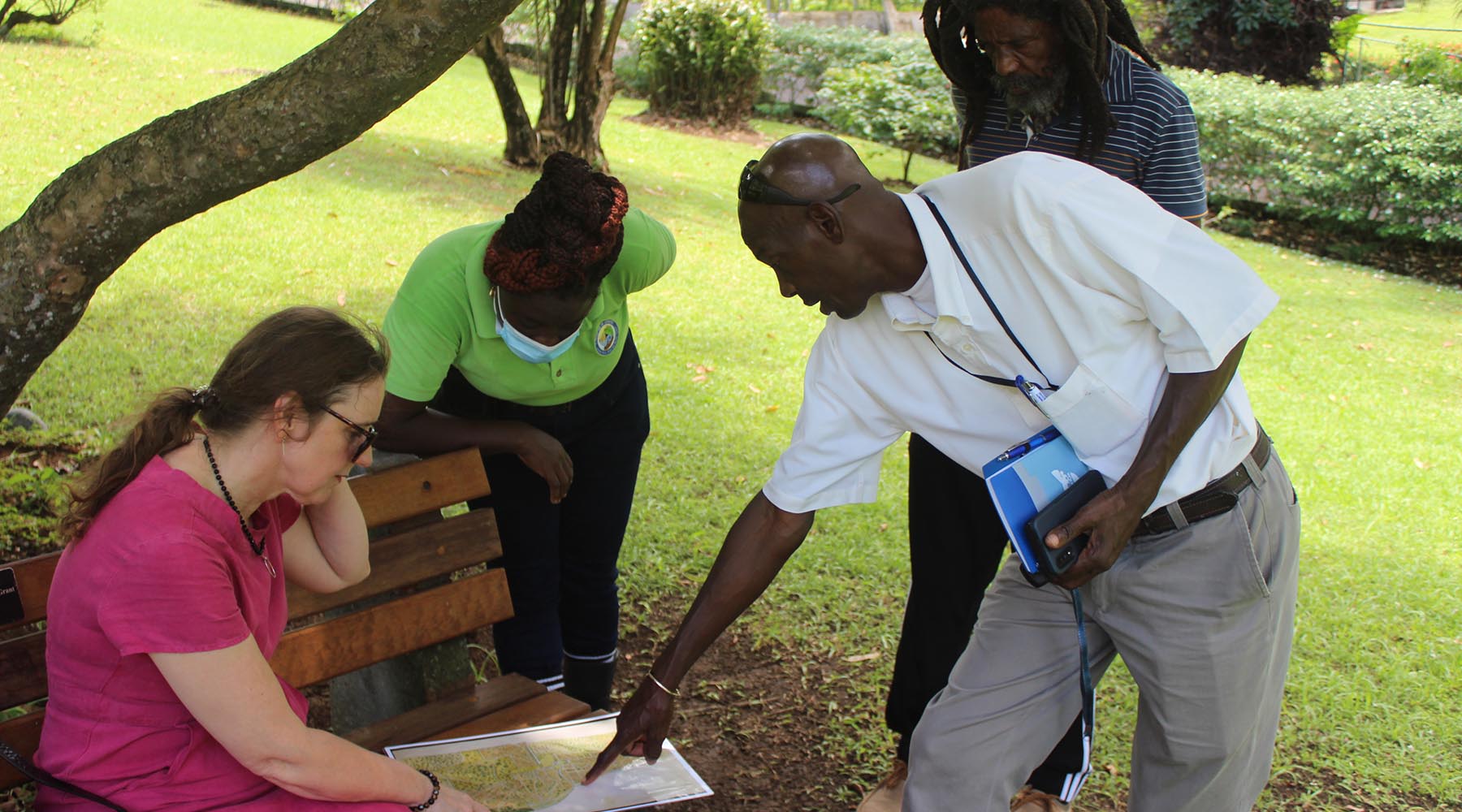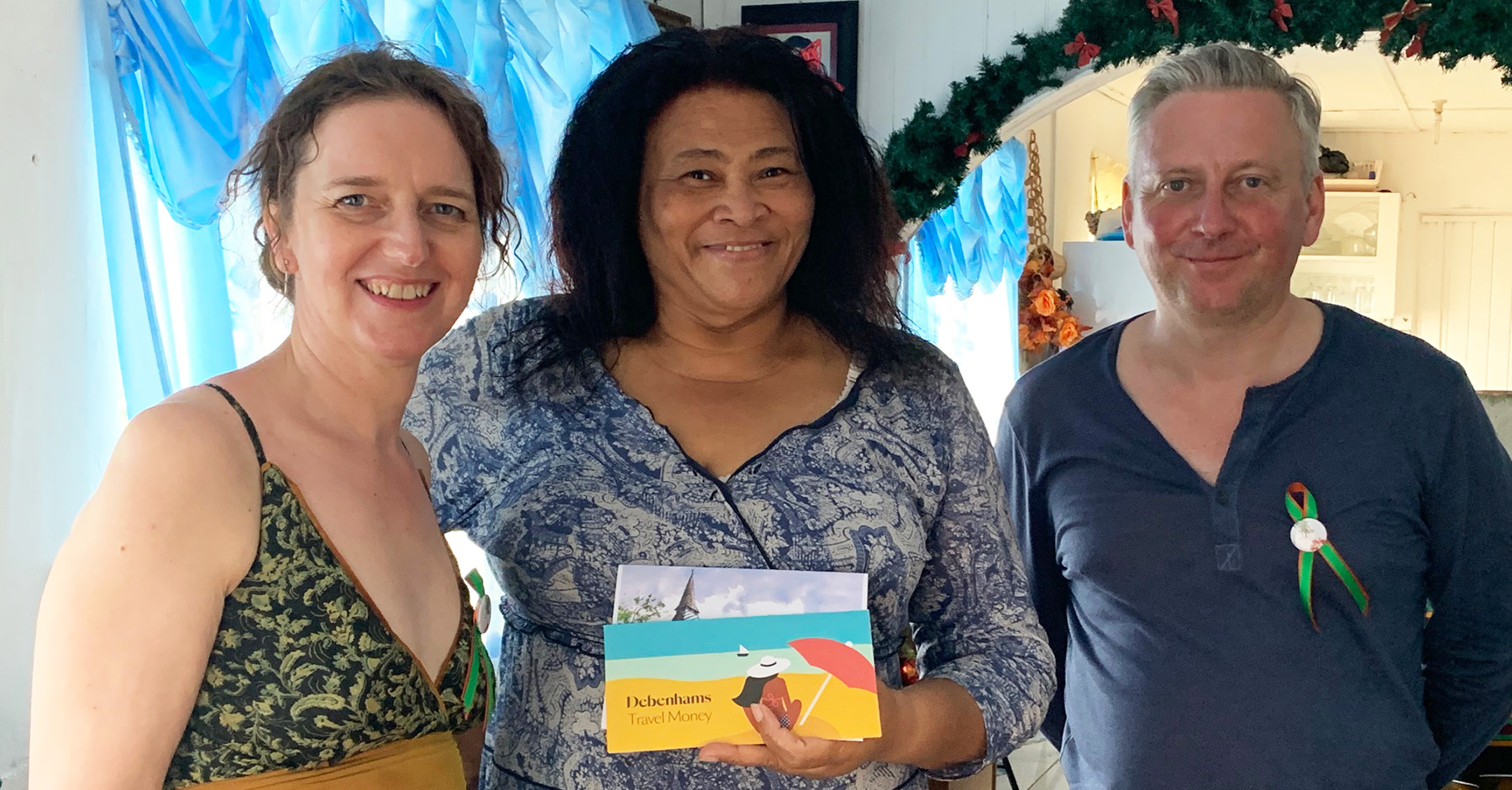Caribbean Research and Community Engagement Projects
Examining the interplay of indigenous, Afro-Caribbean and European cultural development and heritage.

About the projects
Staff and students in the Faculty of Humanities and Social Sciences have been carrying out impactful research and knowledge exchange in the Caribbean. The work comprises an exciting set of related multi-disciplinary projects examining the interplay of indigenous, Afro-Caribbean and European cultural development and cultural heritage over the last 500 years.
The Caribbean is often popularly thought of as a set of wealthy islands focussed on tourist economies, but the reality in the 21st century is one of profound economic and social hardship. Our work has focussed on building capacity to develop sustainable approaches to heritage management with wider implications for economic betterment, social mobility, social justice and education.
Principal Investigator: Prof. Niall Finneran, Professor in Historical Archaeology and Heritage Studies, and Programme Leader MA Cultural Heritage and Resource Management.
For detailed information on each individual project, see below.
The projects
Speightstown, Barbados
The Speightstown Archaeological Research Project is a community heritage project based in Speightstown in northwest Barbados. Combining archaeology, history, education and digital heritage, it seeks to understand the archaeological and historical development of Speightstown. A collaboration between the University of Winchester and the University of the West Indies, it offers extensive scope for archaeological training to students from both institutions. It also has close links with Barbados Museum and the Barbados National Trust.
From the 17th century onwards, Speightstown was Barbados' most thriving port. Barbados was rapidly becoming one of the wealthiest colonies in the world thanks to the cultivation and trade of sugar cane (a system which was built upon African slavery), and Speightstown was an important social and economic hub in the wider imperial system. In fact, Speightstown would become known as 'Little Bristol' owing to the importance of trade with this west-country city.
Speightstown's mercantile class included a number of Sephardic Jews and its hinterland was dominated by a plantocracy (a ruling class formed of plantation owners) whose wealth, manifested in magnificent houses and enriched churches, was built entirely upon the export of sugar cane to new markets in the Americas and Europe. For this, however, they relied wholly upon the exploitation of a massive African slave class.
Speightstown also has other historical curiosities: one of the Caribbean's few whaling centres and the site of the only English Civil War battle to be fought outside Great Britain, the 17th-century fort at Maycocks Bay in northern Barbados. Built to repel French and Dutch raiders, it probably only saw action against English Parliamentary forces.
The project is currently directed by Archaeology research student Connor Thompson-Webb. His PhD project, supervised by Prof. Niall Finneran, is titled 'Speightstown, Barbados: an archaeological study of the townscape and seascape c. 1650 - 1900'. Connor also runs the project's digital platforms.
Bequia Maritime Archaeology and Ethnography Survey, the Grenadines
Bequia is the most northerly of the Grenadines, a small chain of islands in the Southern Caribbean that connect Grenada in the south with St Vincent in the north. One of the main aims of the project is to study the post-Emancipation cultural adaptations of the island, in this case the whaling and boatbuilding industries. In 2014 and 2015, the team undertook extensive survey work there, mapping fortifications, plantation structures and cisterns.
In 2015, a small shore-based tryworks (two large try pots in a brick furnace, one of the most characteristic features of the whaling industry) was recorded and excavated, and some of the historic whaling boats in the Bequia Boat Museum were recorded. These boats are important artefacts, evidence of a vernacular wooden boat building tradition that clearly fossilises elements of post-medieval British ship building technology as well as designs derived from the Yankee whaler boats of the 19th century.
Future work will include undertaking more maritime survey, boat recording and excavation work at the Old Fort sugar estate.
Garifuna Community Heritage Project, St Vincent and the Grenadines
The Garifuna peoples (known historically as 'Black Caribs') see their ethnogenesis in the intermarriage of indigenous island Kalinago (Carib) peoples and runaway Africa slaves in the 18th century. Persecuted by the British for their role in organised military resistance in the Windward islands in the 1790s, many were removed to the island of Roatan in the Honduras where their descendants live today. Many still live on the Windward (eastern) side of St Vincent in settlements such as Grand Sable, Owia, Fortune and Greiggs, where they form a vibrant cultural minority.
Following on from extensive community heritage and archaeology work undertaken by Dr Finneran in Barbados since 2010, since 2018 work has focussed upon the indigenous Garifuna minority of St Vincent and the Grenadines, and their relationship with other Vincentians, outsiders and the wider Garifuna Diaspora.
The Garifuna project aims to give local people the capacity to develop sustainable community heritage projects. Crossing over between the disciplines of archaeology, anthropology and heritage studies, and emphasising deep-seated local involvement, the team will develop web applications and workshops and also undertake ethnographic and archaeological fieldwork and survey on historical Garifuna sites in St Vincent.
Recent work
In March 2019, the team gave a presentation for the Garifuna Heritage Foundation on the management of Balliceaux; helped to build a heritage trail; helped train local history teachers; gave community workshops; presented a paper at the 6th International Garifuna Heritage Foundation conference. In the same month, we visited the island of Bequia in the northern Grenadines and arranged to set up a schools training session for September 2019, focussing on heritage in a small island setting, and we were informed that a local school teacher and community leader had used our training and advice from the previous year. We also undertook a survey among the local population about Garifuna cultural heritage and priorities, and used a team building exercise to encourage the local community to think about leaflet writing and heritage interpretation.
In March 2020, Prof. Finneran and Dr Welch once again attended the International Garifuna Conference, an important international forum for all marginalised indigenous peoples of the Caribbean. They jointly presented two research papers and convened a well-attended two-hour workshop on how to gather and analyse oral history.
The team presented a talk at the Greiggs Village National Heroes Day commemoration on March 14. Dr Welch revealed to the village the fruits of her genealogical research on the origins of the founder of the village - Fanny Greigg, who is buried in Farlington, Portsmouth. Thanks to Dr Welch’s contacts with the Nugee Foundation, patrons of Farlington Church, they were able to present the local school with a £500 donation from that charity.

Dr Christina Welch and Dr Niall Finneran presenting Margaret Jackson, Head of Greiggs Primary school in St Vincent, with a £500 checque from the Nugee Foundation.
They continue to make plans with the Ministry of Education curriculum development department to help train secondary school history teachers in using heritage as a way of reaching their children and helping drive tourism development in the country. They have agreed to take the lead in designing and delivering a series of webinars and training to representatives of 27 Caribbean and peri-Caribbean nations to help them develop approaches to heritage focused tourism.
Prof. Finneran undertook a trip to Bequia where he reconnected with the Bequia Heritage Foundation. He was informed his lecture there in March 2018 raised $500 for the local heritage museum development, and that in recognition of this, and his track record of archaeological and heritage scholarship on the island, his name would be placed on a donors’ plaque there.
They also met with the Bishop of the Windward Islands, the Right Reverend Leopold Calvert Friday, who asked them to help with aspects of managing the Diocesan ecclesiastical heritage, such as recording cemeteries, structures and digitising archives. And they jointly presented the lecture 'Living Stones - Exploring Memorials' at St George's Cathedral on St Vincent.
Prof. Finneran underlined the values-driven approach to their work: "What we strive to do with these marginalised and poor communities speaks to our values on sustainability, social justice and our personal ethos on decolonisation of heritage practice and heritage narratives".
Future work
This will include a survey of the island of Balliceaux, where in 1796 some 4000 ‘Black Caribs/Garifuna’ were kept prisoner by the British prior to their deportation to Roatan off Honduras. Many Garifuna still regard the island as a very special site of memory.
Research team
- Prof. Niall Finneran, Professor in Historical Archaeology and Heritage Studies
- Dr Christina Welch, Reader in Theology, Religion and Philosophy
- Dr Yanique Hume, University of the West Indies, Cave Hill, Barbados
- The Garifuna Heritage Foundation
Unearthing indigenous Caribbean contributions to Western botanical knowledge
A UKRI-funded project, led by Dr Christina Welch (photo top), aiming to understand how the future of modern environmental science can be informed by the past by examining the history of the St Vincent Botanical Garden.
